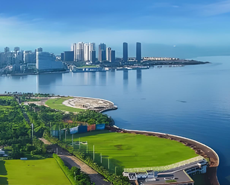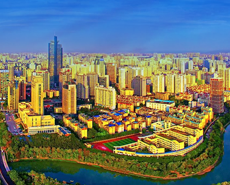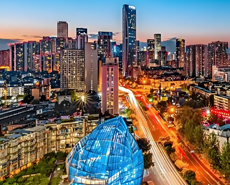
Tight raw material supply to drive brown fused alumina price up further
----Interview with Tan Huaquan
General Manager
Bosai Group Chongqing Saite Corundum Ltd.
General Manager
Bosai Group Chongqing Saite Corundum Ltd.
Chongqing Saite Corundum Ltd. is a relocated project of Bosai Group. In 2014, Bosai moved its four plants located in Guizhou, Guangxi and other regions to the Regenerated Nonferrous Metal Industrial Park in Fuling District, Chongqing, and integrated them into one plant with an annual production capacity of 200,000t of high-grade abrasive materials, which was renamed as Chongqing Saite Corundum Ltd. The 200,000tpy production capacity consists of 140,000tpy capacity of refractory grade materials and 60,000tpy capacity of abrasive grade materials.
Asian Metal: As one of the top 500 private companies in China, would you please first give an introduction on your company?
Mr. Tan: Bosai Group was set up in August 1994, and now it has a total asset of over RMB10 billion (USD1.49 billion) and has an annual production revenue of over RMB20 billion (USD2.98 billion). Of our more than 7,000 employees around the world, over 1,200 are from other countries. As a company having over 10 large-sized production bases and branches in Chongqing, Sichuan, Guyana (South Africa), Ghana (Africa), Germany and other regions, Bosai Group is one of the first and most successful companies opening to the world in Chongqing and even in China.
Around the world, Bosai Group boasts over 300 million tons of high-quality bauxite resources and over 30 million tons of high-grade manganese ores. All the way, we have been insisting upon co-development of aluminum and ferroalloy businesses which are our two major businesses. Now the company has the following production capacities including 6.5 million tons of bauxite per year, 300,000tpy of high-Al calcined bauxite, 200,000tpy of brown fused alumina, 1.6 million tons of alumina per year, 330,000tpy of primary aluminum, and processing capacities of 150,000tpy of aluminum product and 550,000tpy of silicomanganese. In 2019 we will build a new production capacity of 600,000tpy of manganese concentrate and another 200,000tpy of high-Al calcined bauxite capacity.


Asian Metal: Regarding your brown fused alumina business, I learn that your company used to have seven furnaces in Nanchuan and now this figure has expanded to 16 in total. Would you please briefly introduce your development history and product structure?
Mr. Tan: Our brown fused alumina section originated from the seven furnaces in Nanchuan and later expanded into a total of 25 furnaces located in Guizhou and Guangxi. Later, in response to Chongqing government policies on investment-inviting and on intensive management on local industries, all these furnaces were moved to Fuling district, Chongqing city. Resorting to advantages such as favorable electricity prices in Chongqing and our proximity to the Yangtze River, we began to produce high-grade refractory materials with high-Al low-Si calcined bauxite from Guyana as raw material. At present, high-grade refractory material output accounts for about 90% of our total production.


Asian Metal: Over the recent three years, Chinese government attaches increasing importance to environmental protection and keeps consummating its policies on environmental protection and safety production. Brown fused alumina industry, as an industry consuming large quantities of energy, has been under great impacts. What are your measures in response to increasingly strict environmental inspections in China, and what are your achievements?
Mr. Tan: As a new plant just going into operation in 2015, Chongqing Saite Corundum has done quite a lot of work to improve its environmental performance. So far we have invested about RMB40 million (USD5.96 million) into environmental facilities and have realized clean production. We also carry out many publicity and training activities on environmental protection and have greatly enhanced environmental protection awareness of our employees.


Asian Metal: As far as I know, Chinese brown fused alumina producers reported declining output over the past two years as a result of both strict environmental inspections and supply shortage of raw materials. What was your brown fused alumina output in 2018 and what will it be in 2019?
Mr. Tan: Our brown fused alumina output was only 100,000t in 2018 affected by tight supply of raw material, and is expected to be 140,000t in 2019 as we will transport calcined bauxite from overseas mines.
Asian Metal: What are the domestic and overseas proportions in your total selling? How do you think of development trend of the Chinese export market?
Mr. Tan: Currently, 80% of our brown fused alumina output is sold on the domestic market while the remaining 20% sold on overseas markets, but we believe that the export share will increase in our total sales. In the past years, there were many illegal activities existing in the Chinese export market, such as tariff dodging and smuggling, which prevented the market from moving ahead in a healthy way. But Chinese government has adjusted its tax policies and consummated monitoring system, and moreover, consummated cross-border trading procedures and cracked down hard on tariff dodging, so we believe that export prices for brown fused alumina will rise to some extent and we will become competitive in the export market.


Asian Metal: Development of brown fused alumina industry highly depends on natural mineral resources. But in recent years China has set limitative policies upon bauxite mining and supply of high-quality bauxite becomes increasingly tight, driving its prices up continuously. What is your opinion on this situation? From 2017 to 2018, supply of high-quality bauxite was quite tight and many brown fused alumina producers faced a plight of nowhere to source raw material at all, which is why supply of brown fused alumina also became tight. How did your company ensure your production and supply as well as product quality?
Mr. Tan: Bauxite is the main raw material for brown fused alumina and Chinese alumina producers also have great demand for the material. With environmental inspections in China becoming stricter, bauxite producers have invested a lot into their production process and equipment, and accordingly their costs keep increasing. We believe that prices for abrasive-grade calcined bauxite will go up further and its supply shortage will exist for a long time. As we have overseas production bases for bauxite and also as we are close to the Yangtze River, we have transported 40,000t of abrasive grade calcined bauxite to China so far this year, which absolutely can ensure our normal production. Now we plan to build a abrasive grade calcined bauxite base in China which will use overseas high-quality bauxite as raw material. By doing this, we can effectively ensure raw material supply and therefore can ensure our capacity and quality of brown fused alumina supply.
Asian Metal: In response to China's limitation policy on high-grade bauxite mining, many Chinese brown fused alumina producers and calcined bauxite producers have been trying to source bauxite resources in overseas markets and even consider building plants in other countries. How do you think of this phenomenon?
Mr. Tan: To build plants overseas, you have to evaluate a few factors. For example, can you ensure production safety and large-amount investments? And moreover, it takes a quite long time for such plants to see yields after investments have been made. In my opinion, Chinese brown fused alumina companies are usually of no great size and it will be difficult for them to expand businesses into other countries as such activities have great potential risks and require large-amount investment funds.














